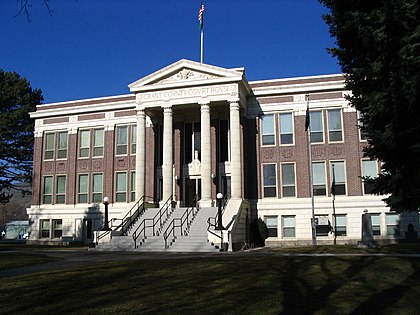Ephrata
History
Ephrata was officially incorporated on June 21, 1909 and was given the county seat for the newly created Grant County.
The settlement of Ephrata is quite recent. There was no known settlement until 1886, just three years before Washington gained statehood. The horse rancher Frank Beezley was the first to settle near the natural springs, thus the area was known as Beezley Springs. As the climate and topography were not promising to settlement, the entire region remained sparsely populated until several federal congressional actions, including the Northern Pacific Land Grant Act, the Homestead Act, and Desert Claims Act, encouraged the settlement of this semi-arid desert-like area. Originally, Douglas County spread over the entire territory of the Big Bend of the Columbia River. In 1909, the Washington State legislature divided it, creating Grant County. When the time came to present arguments to the state legislature regarding which town should be the county seat, someone apparently intentionally intoxicated the representative of a rival community, and Ephrata was chosen.
It is generally believed that the city was named Ephrata by a man who worked for the Great Northern Railway. The name Ephrata is derived from a biblical description of an orchard in the middle of the desert. It is also the ancient name for the town of Bethlehem.
The region was known at the turn of the century for the great herds of wild horses that roamed the land. Horse trading was an important element of the local economy, and Ephrata served as the staging area for the horse round-ups. The last “Grand Horse Round-up” was held in Ephrata in 1906. Ephrata then developed as a trade and service center for cattle and sheep ranches in the area until the construction of the Columbia Basin Reclamation Project.
In 1939, one of the state’s longest runways was built at Ephrata Municipal Airport and served the U.S. Army Air Corps until 1945, when the field was turned into a commercial airport. The airport and hangars were used in Steven Spielberg’s 1989 film Always, the final movie to feature Audrey Hepburn.
Ephrata was in the national spotlight in a segment on 60 Minutes II after the 2003 murder of Craig Sorger by Evan Savoie and Jake Eakin. The two accused were the youngest defendants in state history to be tried as adults.
Grant County Public Utility District has its headquarters located in Ephrata.
Columbia Basin Irrigation Project
Beginning in July 1918, several prominent Ephrata residents started the promotion of a plan to redirect waters of the Columbia River in order to irrigate the dry but fertile soils of the Big Bend country. Labeled “The Dam University”, Ephrata residents persistently lobbied at the local, state, and federal levels to gather support for the project. Initial funding for the Grand Coulee Dam was through the Public Works Administration created under Franklin Roosevelt’s promise of a “New Deal” in 1933. However, the irrigation waters would not be released as the nation focused on ending World War II during the 1940s. During this era, Grand Coulee Dam’s main mission was to produce electricity for the Hanford Reservation and for aluminum manufacturing, vital to military aircraft production. When the war ended, the Project returned to its original mission, to irrigate the desert.
Population growth
The construction of the Irrigation Project and the military activity increased the population of Ephrata by a factor of eight between 1940 and 1960. As the federal projects phased out, the town experienced a population decrease of 22% between 1960 and 1975. The population stabilized between 1975 and 1982, with a slight decrease between 1980 and 1990. The city has seen steady population growth since 1990. The present population is 7,110.





